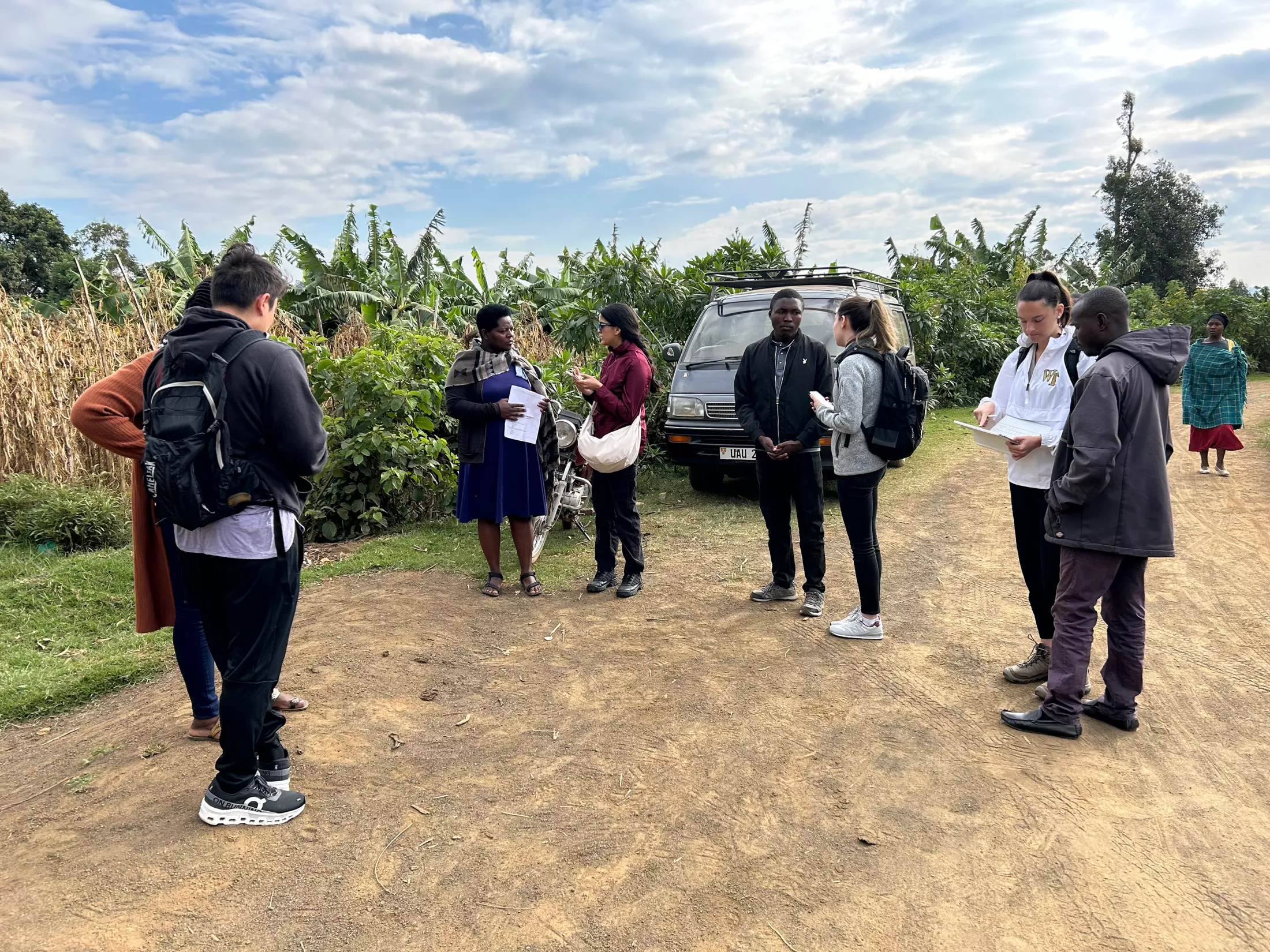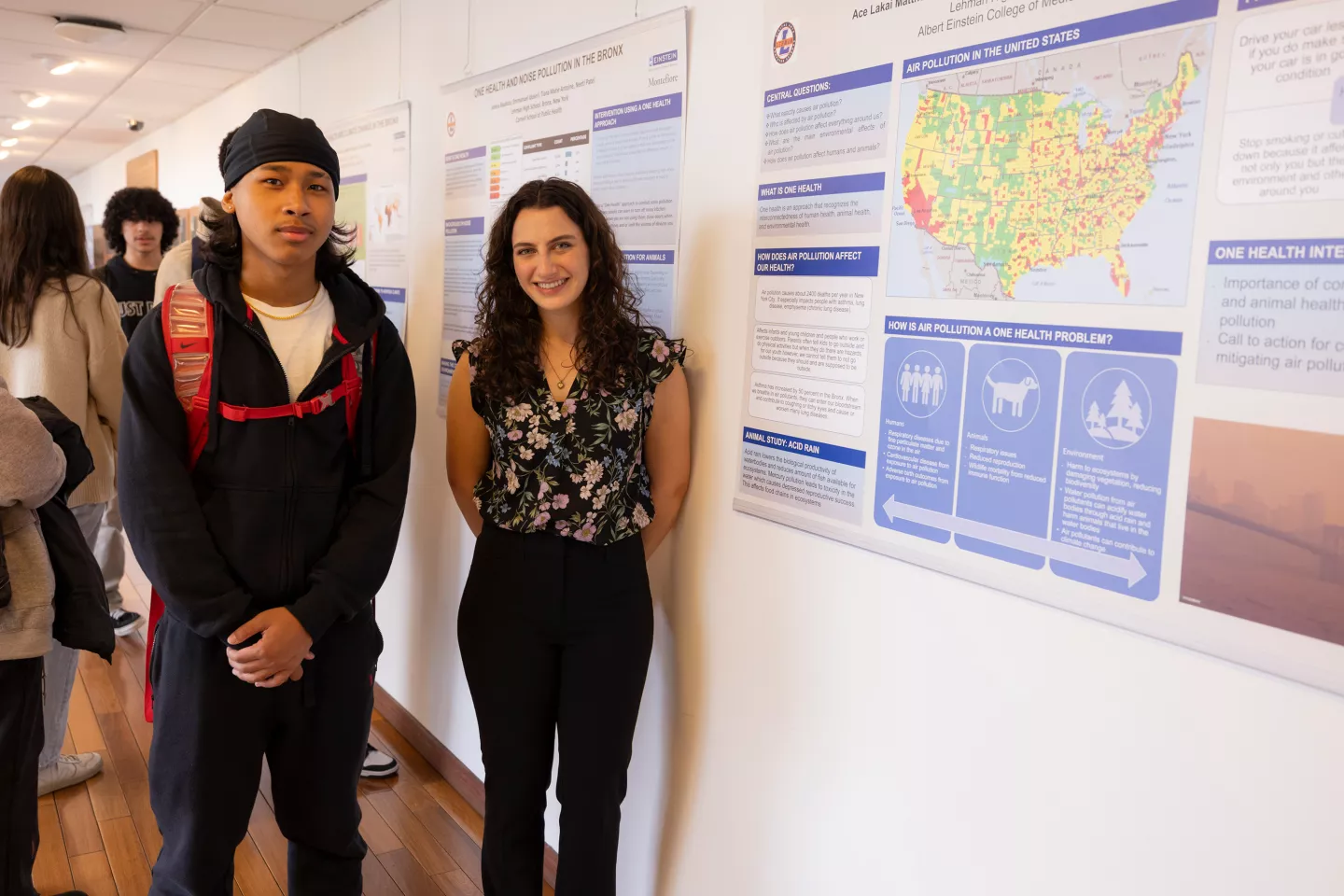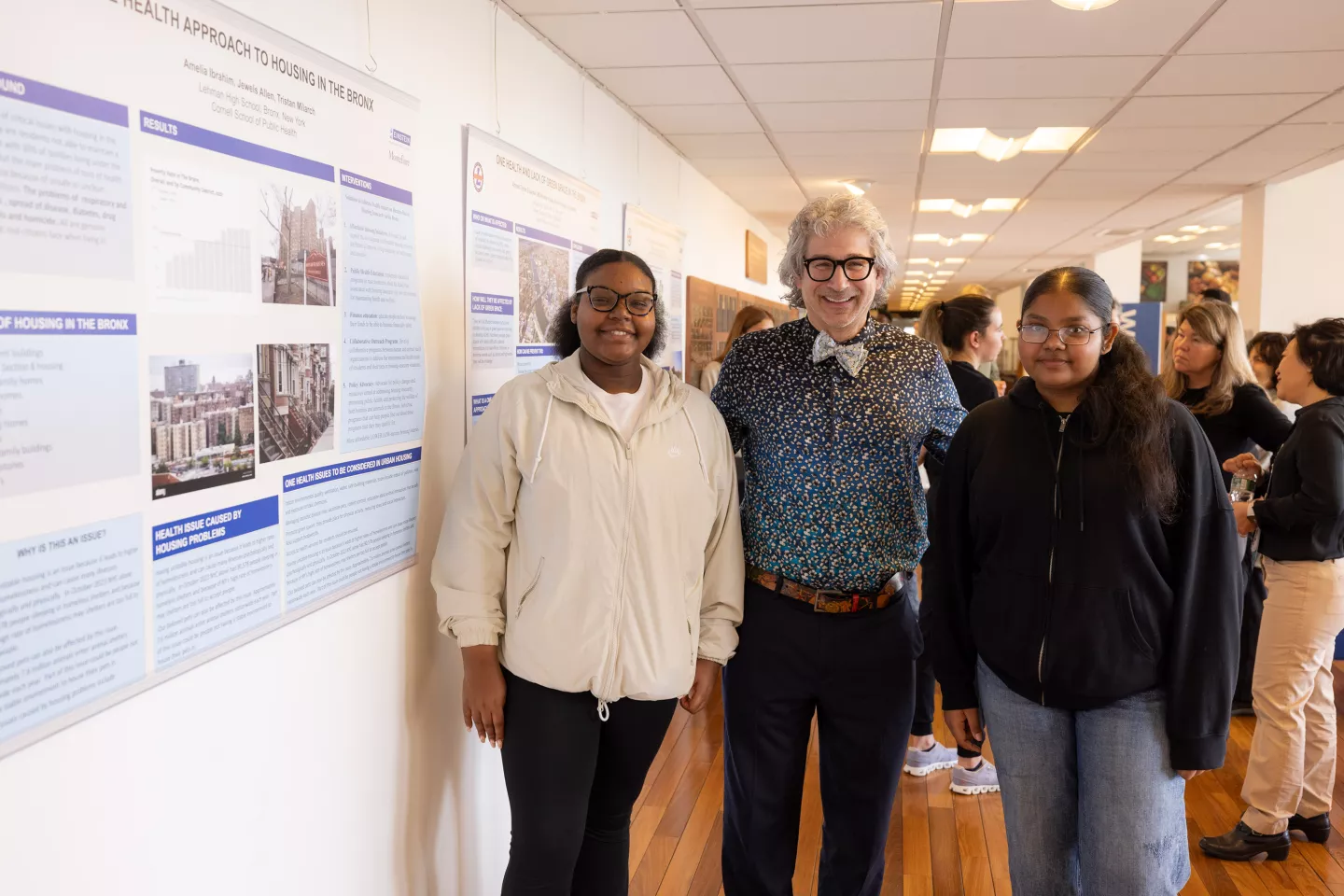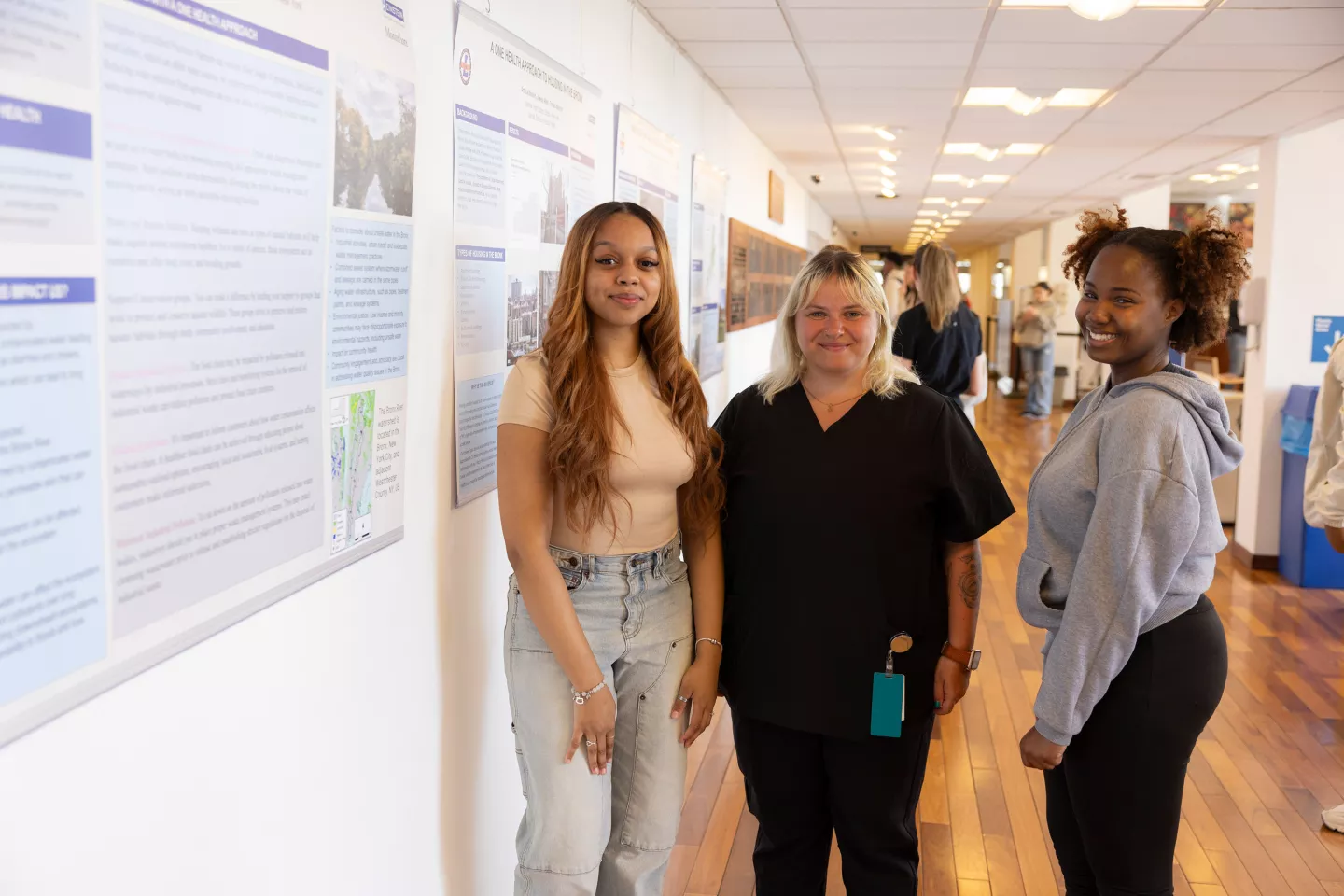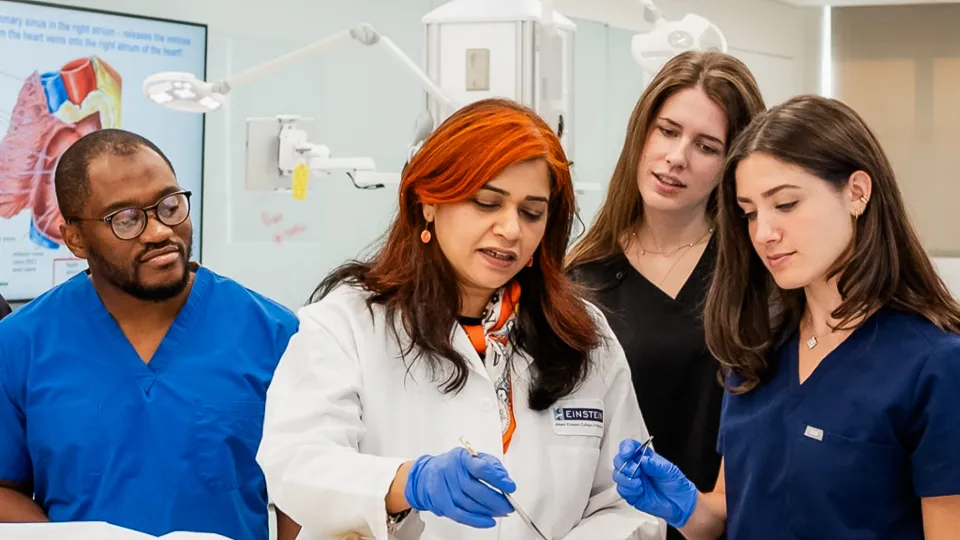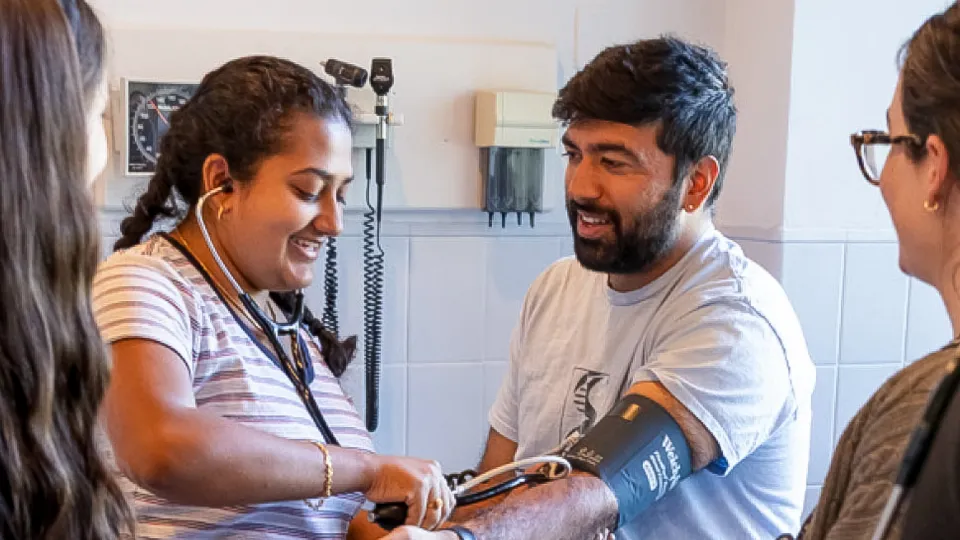Feature
Einstein Global Health Fellowship Students Explore the Link Between People, Animals, and the Environment
High Schoolers in the Bronx and Uganda Join Multiyear 'One Health' Project
October 1, 2024
Medical students at Albert Einstein College of Medicine brought together high school students an ocean apart—from Herbert Lehman High School in the Bronx and Vision Secondary School in Kisoro, Uganda—to investigate how the health of people, animals, plants, and their shared environment are deeply connected, a concept known as “One Health.”
After months of conversation and research, Zoom calls and collaboration, the project was put on display as part of a global health poster session held in Forchheimer this past spring. The urban Bronx and rural African high school students, under the supervision and guidance of Einstein faculty and medical students, brought to light such issues as emerging zoonotic diseases, food and water safety, and threats to ecosystems on a local, national, and global level.
The event was just one element of an ongoing initiative that includes a multiyear public health research partnership in Uganda. “I don’t know of any other program like this: It’s multilevel, multidisciplinary, and cross-cultural, involving medical, graduate, and high school students learning on different levels,” said Jill Raufman, M.P.H., M.S., who led the program and is the associate director of Einstein’s Global Health Center, director of the Global Health Fellowship Program, and director of Einstein’s M.D./M.P.H. degree program.
A Global Health Fellowship Project
Einstein has a longstanding commitment to offering global health opportunities. “These experiences help students develop humility and compassion toward others and better understand how a person’s circumstances affect their health,” said Louis Weiss, M.D., M.P.H., codirector of the Einstein Global Health Center and a professor of pathology and of medicine at Einstein.
The work began more than two years ago, in 2022, when Ms. Raufman brought together a group of Einstein medical students interested in One Health to develop a research project about the concept. They decided to focus their efforts on Kisoro, a rural district in the East African nation of Uganda, with which Einstein and Montefiore have a decades-long relationship. “Kisoro, which sits on the edge of a national park, is an ideal place to focus on One Health,” Ms. Raufman said.
“There is a lot of interaction among humans, their domestic animals, and wildlife in Kisoro,” she explained. “For example, people’s farm animals will interact with wild animals, potentially picking up diseases. And people and their farm animals commonly share the same body of water for drinking and bathing and share space inside people’s homes. These behaviors greatly increase the risk for illness.”
Einstein students teamed up with public health and veterinary students from Cornell University and immersed themselves in analyzing health data from the region. They developed a proposal for a multi-phase, public health education initiative that would be tailored to the needs of the Kisoro community. Ms. Raufman traveled to Uganda in 2022 to present their ideas to local leaders and village health workers.
“One Health frames things in a way that can make sense to people who are in frequent contact with wildlife and their natural environment,” said Ms. Raufman. “The local leaders told us they were happy to partner with us.”
Ms. Raufman and four Einstein students returned to Kisoro in June 2024 to meet and travel with village health workers, who are on the frontline of healthcare in the area and are trusted members of the community. They also accompanied Vision Secondary School students on community field trips, where they learned more about people’s day-to-day behaviors.
“We visited a water filtration plant,” Einstein third-year medical student Simran Randev explained. “The Kisoro students led the way in seeking out community members to interview, and their faces lit up when they were able to persuade people to use safer health practices, such as filling their drinking water jugs upstream, closer to the filtration plant, and not near where people were washing their motorbikes or doing laundry.”
The next phase of the project, which will take place next year, will involve working with Kisoro’s village health workers to incorporate One Health concepts into weekly visits with patients.
Bringing One Health to the Bronx
An exchange of One Health ideas between the secondary students in Kisoro and high school students in the Bronx was added as another element of the overall program. “More than 60% of Kisoro’s population is under 19, so we wanted to plant a seed with the high school students about ideas that can have an impact,” said Ms. Raufman, who has been working on such projects for years through her nonprofit, Kiboko Projects. Through Einstein’s relationships with local Bronx schools, the exchange of ideas seemed like a natural fit.
Under the guidance of Einstein faculty, the Global Health Fellowship students delivered lessons on One Health concepts to the high schoolers—in person at Lehman and over teleconference to those in Uganda—and followed up with mentoring sessions.
While their surroundings are radically different, students on opposite sides of the world landed on common themes. “Trash and disposing of things improperly were definitely commonalities,” said Kerry Marlow, a fourth-year student at Einstein. “And both groups were concerned about the pollution they became aware of in their environment.”
Although the concept of One Health was new to many of the younger students, they quickly offered examples from their own lives, Ms. Marlow said. “One group I worked with brought up how a lack of green space for spending time outdoors could negatively impact people with attention deficit disorder more than others. I was so impressed by their ability to connect the environment and land use with a medical diagnosis.”
This year’s project, creating a scientific poster, was something many of the high schoolers had never heard of before. But with the help of their Einstein mentors, the younger students pulled together the pieces—research, photos, graphics, references, and writing—into a finished product that they were clearly proud to present at Einstein.
Lehman High juniors Nevaeha Thomas and Jariely Perez decided to focus their research on unsafe drinking water in the Bronx. “I really wanted to talk about water because it’s a big problem that I see constantly,” Ms. Perez said. “I walk by areas of water that are filthy and disgusting and wonder if that’s connected to people getting sick.” Her high school epidemiology class had been learning about incidents from the past few years where waterborne diseases had sickened or killed Bronx residents.
About a dozen other Lehman High School students presented posters on health concerns affecting the Bronx: climate change, unsafe housing, food insecurity, and air and noise pollution. Emma Gordon, a second-year, was among the medical students who helped guide them through it and learned from the experience: “I’m discovering ways to combine my interests in environmental issues and medicine. I think it will have a lasting impact on my career.”
A Broader Perspective
The secondary school students from Uganda joined the poster presentation via a large video screen conference call set up in the Main Street Café in Forchheimer. “It’s one thing to hear about your counterparts in another country and see what they’ve worked on, but when you can speak to them live, that makes it real,” Ms. Raufman said.
Ultimately, the project helps demonstrate that serious problems can have practical solutions, said Batsheva Lazaroff, an Einstein fourth-year medical student. “I like that everything that we’re learning and teaching is actionable. It’s an opportunity to think about healthcare in a more collaborative sense and how we can affect real change in certain communities.”
In addition to teaching about the concept of One Health, the project, like other Einstein global health programs, cultivates cultural humility, said Ms. Raufman, which she defines as being open to learning from others and exploring how our own cultural identities shape our views. “That’s starts with getting an unfiltered look at another culture and having the chance to exchange ideas,” she said.
Since working on the One Health project, Lehman senior Emmanuel Iduseri said that he looks at the world differently. “Before, I was only thinking about myself,” he said. Now, he sees how people, animals, and the environment all affect each other. “If you want to get a better society, you have to look at things from a broader perspective.”


